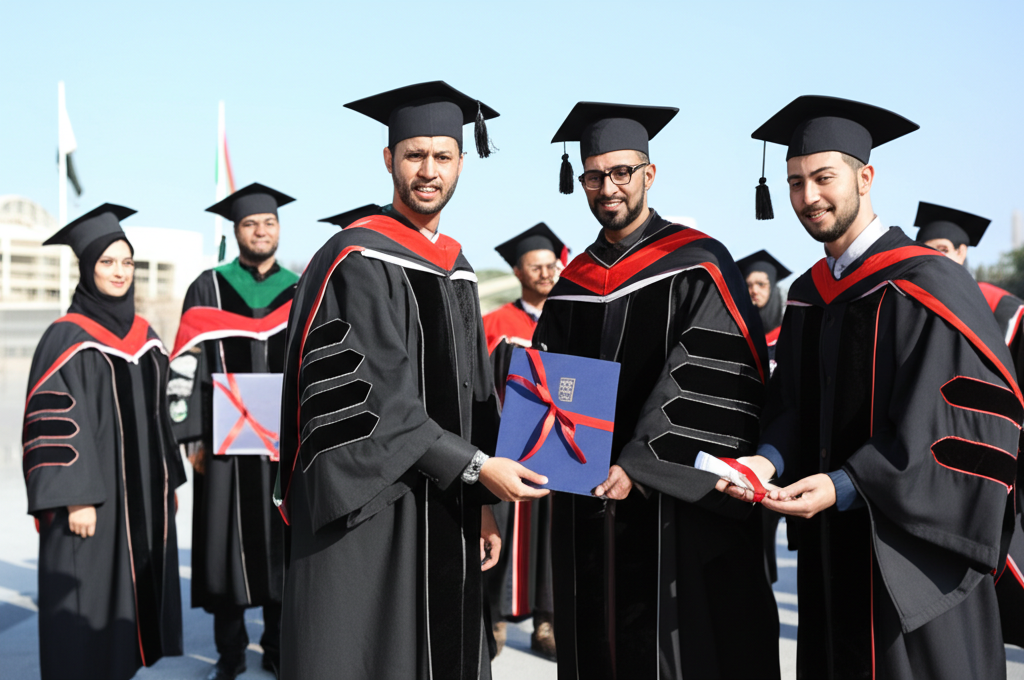Studying Abroad in Arab: Opportunities for Learning and Personal Development
Estimated reading time: 10 minutes
Key Takeaways
- Studying abroad in Arab offers personal, academic, and cultural development opportunities.
- Arab countries offer prestigious universities and generous scholarship programs.
- Students can experience the culture and learn the Arabic language, expanding their career prospects.
- Countries like Saudi Arabia, UAE, Qatar, Egypt, Lebanon, and Jordan are prominent destinations.
- The cost of education and living in the Arab world is relatively reasonable.
Table of Contents
- Introduction to Studying Abroad in Arab
- Benefits of Studying Abroad in Arab
- Prominent Arab Countries for Studying Abroad
- Requirements and Conditions for Studying Abroad in Arab
- Costs and Scholarships for Studying Abroad in Arab
- Living and Studying Experience in Arab
- Career Opportunities After Studying Abroad in Arab
- Conclusion on Studying Abroad in Arab
- Frequently Asked Questions
Introduction to Studying Abroad in Arab
Studying abroad in Arab offers an excellent opportunity for personal, academic, and cultural development. Arab countries not only have prestigious universities but also offer generous scholarship programs and profound cultural experiences. Students can accumulate knowledge and skills while exploring the rich traditions of the Arab world.
Benefits of Studying Abroad in Arab
High-Quality Education
Many Arab countries like Saudi Arabia and United Arab Emirates (UAE) have globally recognized universities that provide modern facilities and high-quality programs. For example, King Abdulaziz University in Saudi Arabia is one of the world’s top universities, offering full scholarship programs for international students.
Cultural Experience
Students have the opportunity to experience the rich traditions, languages, and histories of the Arab world, helping to develop intercultural competence. Learning Arabic not only opens doors to the local culture but also facilitates future career prospects.
Language Learning
Learning Arabic can enhance career prospects as the language is widely used in diplomacy, global commerce, and international organizations.
Career Opportunities
The rapidly developing economies of Arab countries, particularly in finance, energy, and technology, provide attractive job prospects for graduates. The labor market in Dubai and Saudi Arabia is especially appealing due to the fast economic growth.
Prominent Arab Countries for Studying Abroad
Prominent Arab countries for studying abroad include Saudi Arabia, United Arab Emirates (UAE), Qatar, Egypt, Lebanon, and Jordan.
Saudi Arabia
King Abdulaziz University (ranked #134 globally) offers many undergraduate and postgraduate programs with full scholarships for international students. Saudi Arabia also provides full scholarships that include tuition, accommodation, and a monthly stipend.
United Arab Emirates (UAE)
Dubai and Abu Dhabi host branches of prestigious international universities such as American University in Dubai and Middlesex University. Students in the UAE benefit from flexible visa policies, working opportunities during and after studies, along with modern facilities.
Qatar
Education City in Doha includes campuses of top universities like Georgetown University and Carnegie Mellon University, offering programs ranging from humanities to science and technology.

Egypt, Lebanon, and Jordan
These countries are also popular destinations with ancient universities and scholarship programs in various fields.
Requirements and Conditions for Studying Abroad in Arab
Academic Requirements
- Undergraduate: Requires a high school diploma and a minimum average score (usually 8.0/10 in Saudi Arabia).
- Postgraduate: Requires a bachelor’s degree with an equivalent recognized. Some programs may require work experience.
Language Proficiency
For students not using Arabic, English proficiency certificates (TOEFL/IELTS) are often mandatory.
Visa Application Process
The visa application process is usually streamlined and managed directly by universities, requiring necessary documents such as a valid passport, academic qualifications, and financial proof.
Costs and Scholarships for Studying Abroad in Arab
Costs of Studying in Arab
- Tuition Fees: Tuition fees range from approximately $10,000 to $15,000 per year, depending on the program and country.
- Living Expenses: Living expenses in cities like Riyadh or Dubai are relatively reasonable compared to Western capitals.
Scholarships for Studying Abroad in Arab
Scholarships for studying abroad in Arab are abundant and attractive:
- Full scholarships typically include tuition fees, accommodation, healthcare, and even allowances. For example, scholarships from King Abdulaziz University and programs sponsored by the Saudi government.

Living and Studying Experience in Arab
Arab countries provide a unique living and studying experience that combines ancient traditions with modern urban life. Cities like Dubai offer world-class infrastructure, low crime rates, and a global cultural community.
Many international students report feeling welcomed by the local community and that the multicultural learning environment has changed their lives.
Career Opportunities After Studying Abroad in Arab
After completing their studies in Arab countries, students have numerous career opportunities:
- Employment in Arab countries: Graduates often transition into high-income jobs in finance, energy, and technology. Dubai and Saudi Arabia are attractive career hubs due to robust economic growth.
- Global Demand for Arabic Language Skills: Knowledge of Arabic is a sought-after skill in international business, diplomacy, media, and academia, enhancing global employability.
Conclusion on Studying Abroad in Arab
Studying abroad in Arab offers a unique blend of high-quality education, profound cultural experiences, and career opportunities. With accessible scholarships, modern facilities, and rich traditions, Arab countries are increasingly becoming a top choice for ambitious students worldwide. Consider specific programs and scholarship opportunities to embark on this exciting educational journey.
Frequently Asked Questions
Should I learn Arabic?
Learning Arabic can open up many career and cultural opportunities. It is widely used in diplomacy, global commerce, and international organizations. For more information, see here.
How is the Arab market potential?
The Arab market has significant potential with over 422 million Arabic speakers. For more information, see here.
How many countries speak Arabic in the world?
There are 25 countries and territories where Arabic is an official language. For more information, see here.
Is studying in Dubai easy?
Studying in Dubai can be easy with the right conditions and finances. For more information, see here.
What makes the King Abdulaziz scholarship in Saudi Arabia special?
The King Abdulaziz scholarship covers tuition fees, accommodation, healthcare, and monthly allowances for international students. For more information, see here.

